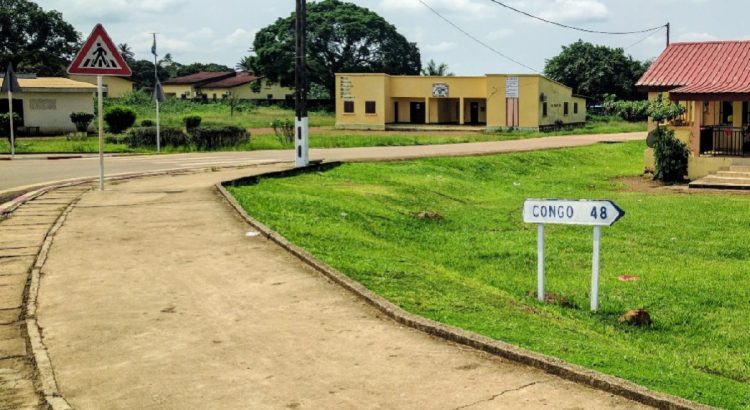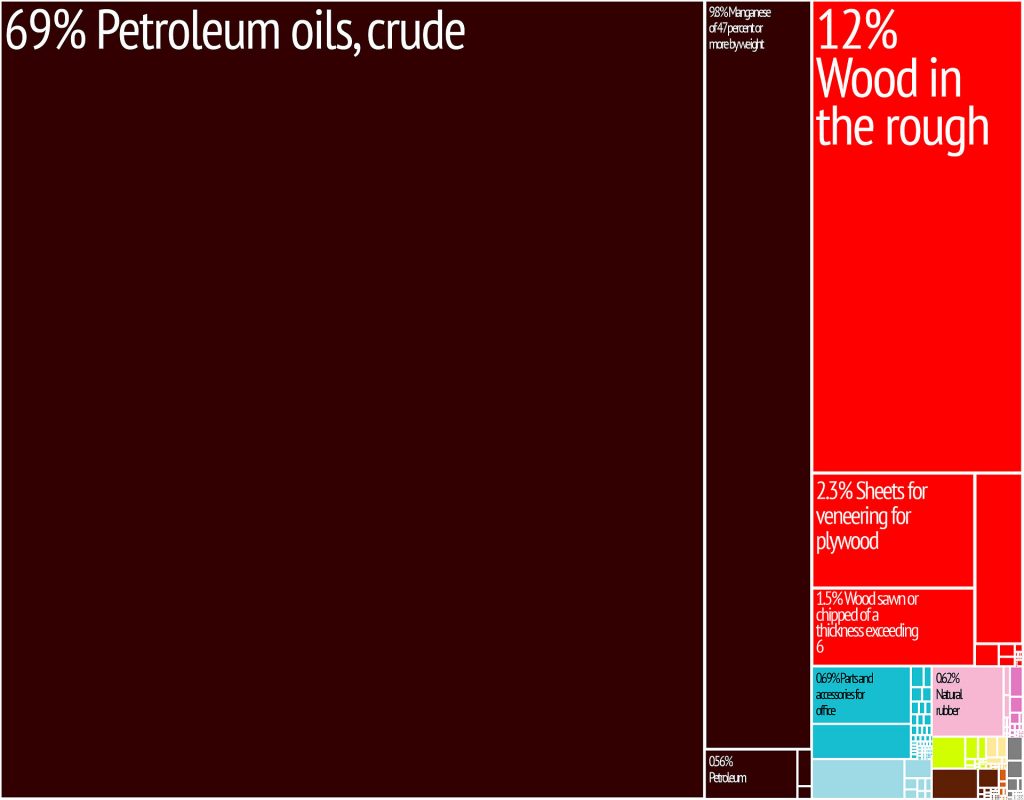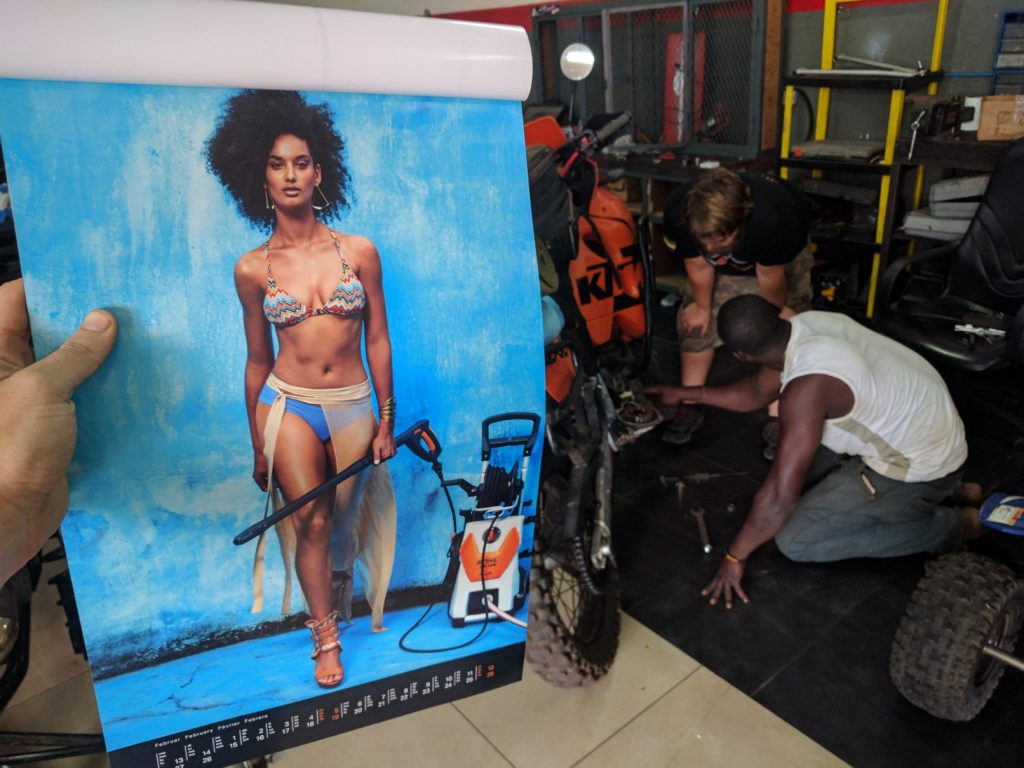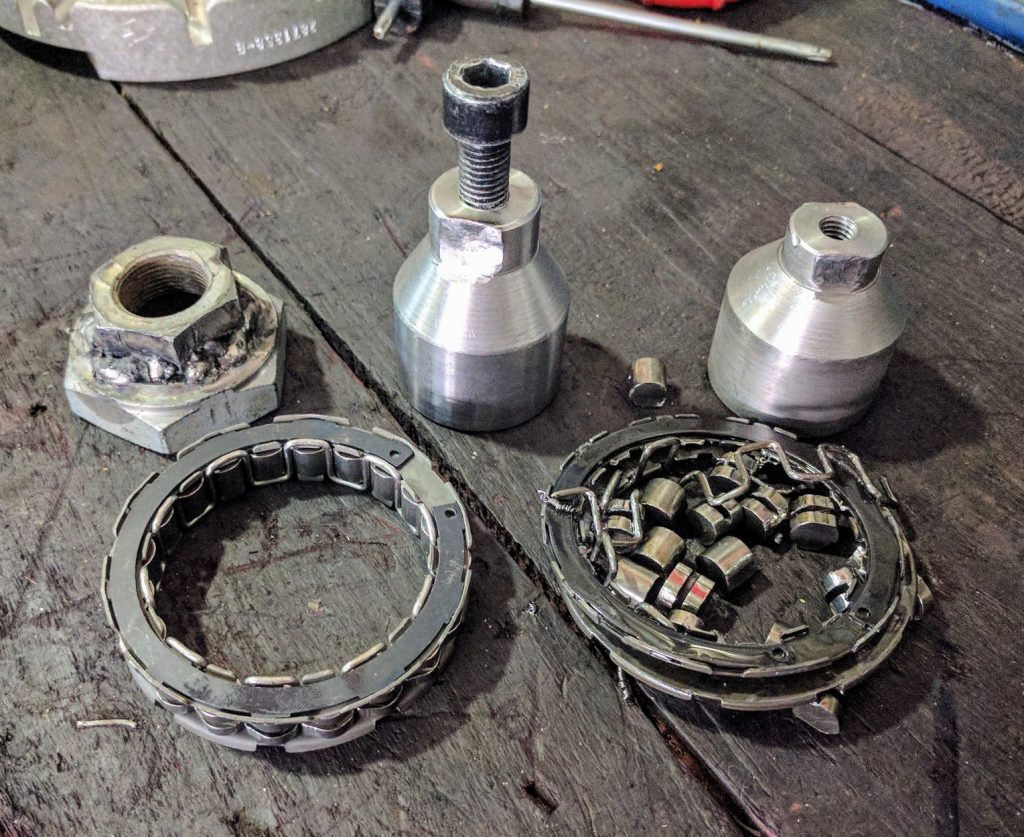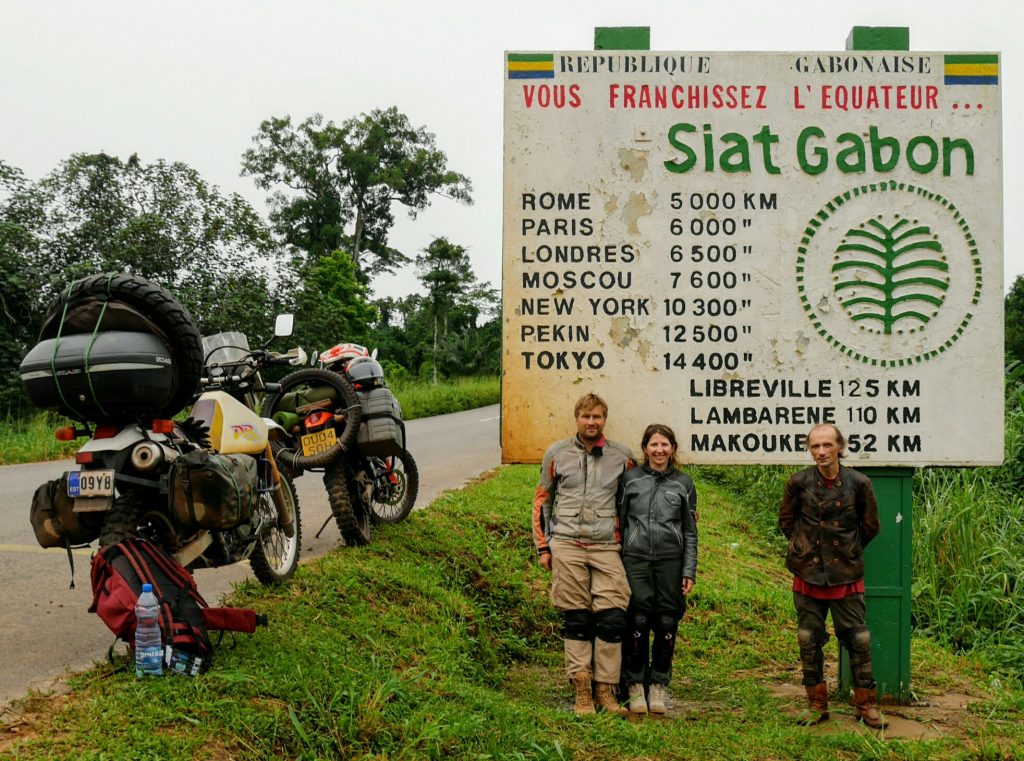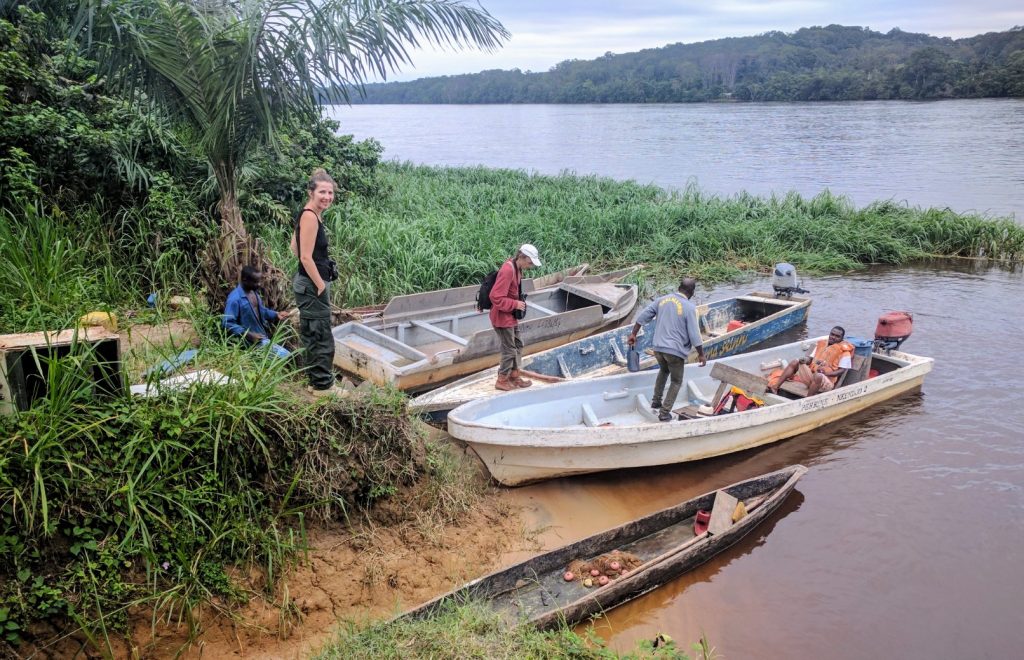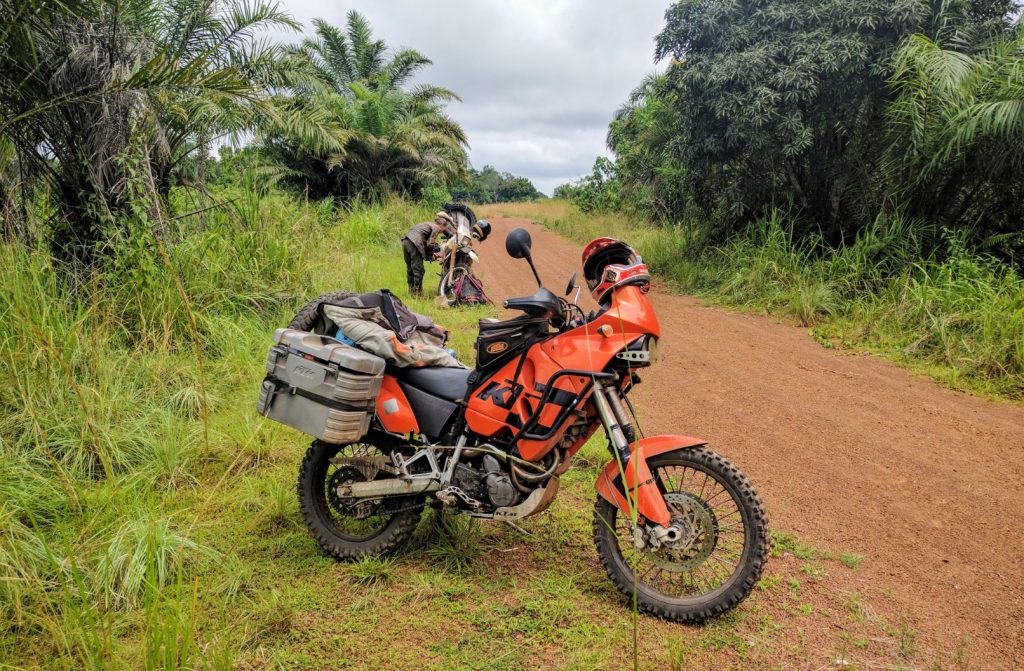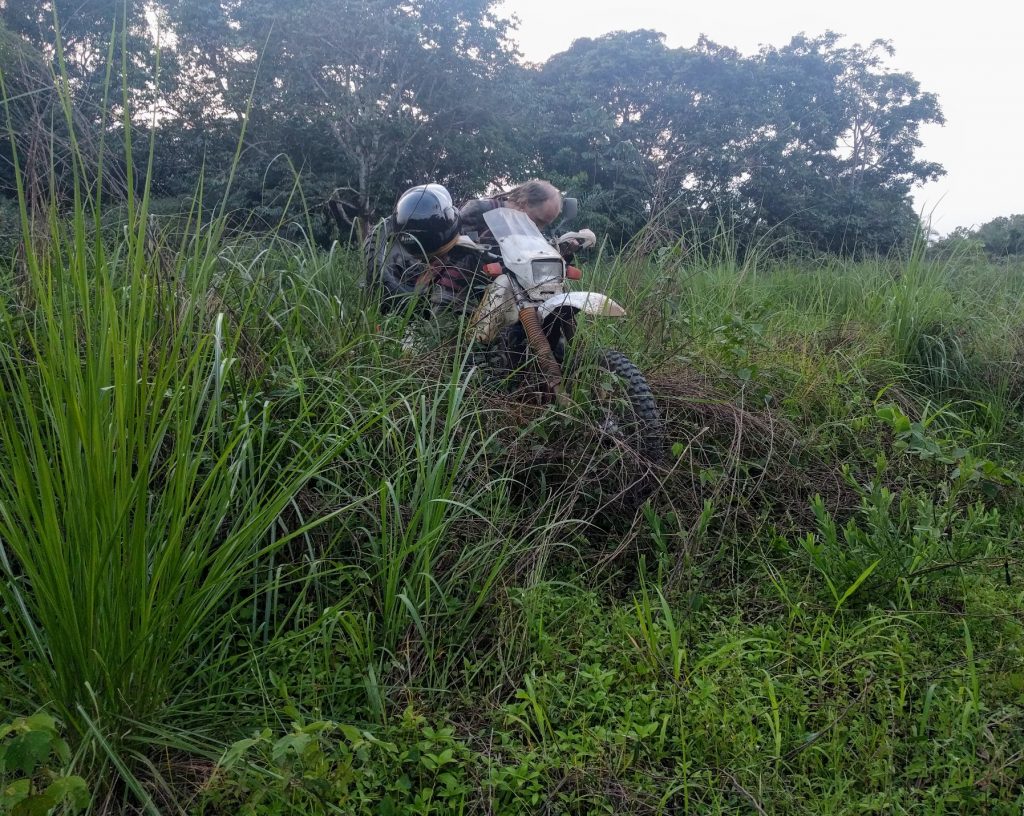The time spent in the workshop with Deleure, my favourite South African mechanic, presented an opportunity to learn about life in Gabon. Deleure had moved here for work. Salaries in Gabon are 3 times what they are back home for him. His workshop was surrounded by million dollar superboats, jetskis, quads. I quizzed, who are the rich folks in Gabon? Apparently 90% of GDP is controlled by 20% of the population. He explained it is mostly the Lebanese, who own the mines inland and have some stake in oil production.
Then there is a bit of service industry for the mining and drilling machinery run by the French engineering prowess. The KTM workshop is owned by a Lebanese dude with a pony tail, who rides a cheap scooter, ownes 26 of these boats and most of the Point Denis resorts.
In a village not far from Libreville we met another foreigner, a Hindu from Ivory Coast who was here setting up a farm on 3000 hectars of rainforest. Gabon is known to import all of its food. He was going to make a bet, that if we’ve had chicken in Gabon, we’ve only had either wings or legs, but never breast. He was right. The reason is, he explains, that all the chicken here is imported from the US and Brazil, where the chicken-making-factories used to throw away the legs and wings, but now they get to freeze them and sell $1 per kilo in many containerfuls to the gabonese. There is no import duty on food, local supermarkets can add 100% margin and still sell at $2 kg.
Apparently most of his farm is going to be greenhouses. What? In this heat? Why would you need a greenhouse when the whole place is a giant unrelenting humid greenhouse? Well apparently here you can use the greenhouse to cool the air and reduce the humidity. Pretty much the opposite of what we’re used to.
The farm here had been set up by the government 3 years ago, who invested $10m into the buildings and kit, but it hadn’t worked for a single day. Now he is trying again, but says that the locals really don’t want to work much. Especially as they are getting $2000 per family handed out by the government for not doing anything. Then no wonder that in the village we were chatting, about 80% are cameroonians, they run the shops, cook the food, do the laundry. The locals have already forgotten what it means to work.
People here say that the long-time president Ondimba had been really generous to the people as he shared a big part of the oil revenue. On the other hand, his son now has a country that doesn’t know how to grow food for itself nor do any other work than extracting oil or cutting the forest. The tiny country has a small army, only 5500 strong. But the presidential guard is 1800. Gives the perspective of where the threat is expected from. You’ll see lots of women in the villages wearing dresses with Ondimba Jr face printed and every 10th dude is wearing an “Ali” t-shirt.
My little starter clutch arrived, but that was just the easy part. We then spent another three days with Deleur using all sorts of tricks to get the flywheel off the crankshaft as the starter clutch is just behind it. We machined three different pullers until on the third day it worked. Then it only took 15 minutes to swap in the new one and put the engine back together. By then I also had a new kickstart, courtesy of a local KTM owner Herve, who lent me his until a new one arrives in the post.
Waiting is part of African travels. Waiting for some part to arrive, for an embassy to come back from holidays, for the mechanic to get the flywheel off. It’s really tricky to get something you need in Africa – it is full of everything, mostly colourful plastic buckets, but never the thing you need. Sometimes by night I’m browsing Amazon Prime and dreaming of buying some of the things I need. Very different to home, where “needing” something that I don’t already have or can’t get quickly is getting rarer every year.
Soon after hitting the road I found out that the new clutch still doesn’t engage. Probably the surface it is supposed to grip had worn off too, although it wasn’t visible. At least I got to take out all the little shreds of metal that was left of my old shattered clutch. I’m gonna be kickstarting through the rest of Africa. Just somewhat nervous for the situations, where we’ll have to leave really quickly. To escape animals, angry villagers or border guards. It will be quite shit sitting there kicking the starter – it takes me 3 minutes on average to get it started after which my shirt will be dripping wet.
We crossed the equator again. The equator-keeper’s house was still here, but empty. We took a photo with a sign instead.
Lambarene is an ancient highway junction in the middle of Gabon. From the time when the rivers were the highways. We arrived by noon and soon found someone who would lend his pirogue for a couple of hours, another dude who dismantled one of his engines for us. Mixed a big barrel of carburant and we were on our way – on this ancient river highway. Ogooue is one of the largest rivers in Africa, behind Congo, Niger and the Nile. Like the Congo river, it starts in the middle of Africa and traverses through thousand kilometers of rainforest before it reaches Lambarene and then a few more hundreds befor hitting the atlantic ocean.
Most of the villages on the river have never seen a car or a motorcycle as they are only accessible by a pirogue. Our hired skipper hand Sonny stopped in one of the typical river village where he was born. About 12 houses of which 3 were decent construction and the rest usual sheds, the perimeter of ca 100m around the compound was well trimmed, then you hit the wall of the rainforest. One of the better looking houses belonged to Sonny’s dad, which he was really proud of. The first dude who arrived to welcome us was almost in tears of happyness to see Sosu (how our skipper was called here, he made me promise I won’t mentioned this name to his mates at the pier in town). The dude was also very drunk and the only grown up male in the village. Couple of ladies were busy with the kitchen and with the army of children aged 2-9 running around the place. There were a couple of lads aged 13-16, who looked that they were actually running the place, fixing things and giving the hand to the ladies. They insisted cooking us fish from the morning catch, but we had to decline and make our way back after dark.
The road south towards Congo is fresh tarmac, apart for the last 50 km, which turned out to be a slippery clay path through the mix of jungle and savannah. The gabonaise border post was a man with a stick with a padlock for security. After filling his notebook with our details and a small argument that we should go back 50km to get a stamp in the last village, he let us pass towards Congo. The border village on the other side was a perfect welcome to Congo. It was 4pm Sunday and Christmas Day afternoon. The only bar-shed had congolese music at full volume and five dudes were dancing like there is now tomorrow. All the officials huts, where they should check your papers were empty and we had to pull some dudes off the dance floor for a second to stamp our passports. Nice change from the Nordic “holy time” when people are quitely eating away on their Christmas feast. We spent about half an hour in the village going through immigration, but the rest of the dance party didn’t even notice we were there. Later on some ladies joined the groove. Check out the second half of the video for a glimpse of how seriously they take their moves.
We’re in Congo. Boom.
New video by Kristo Käärmann
No Description
